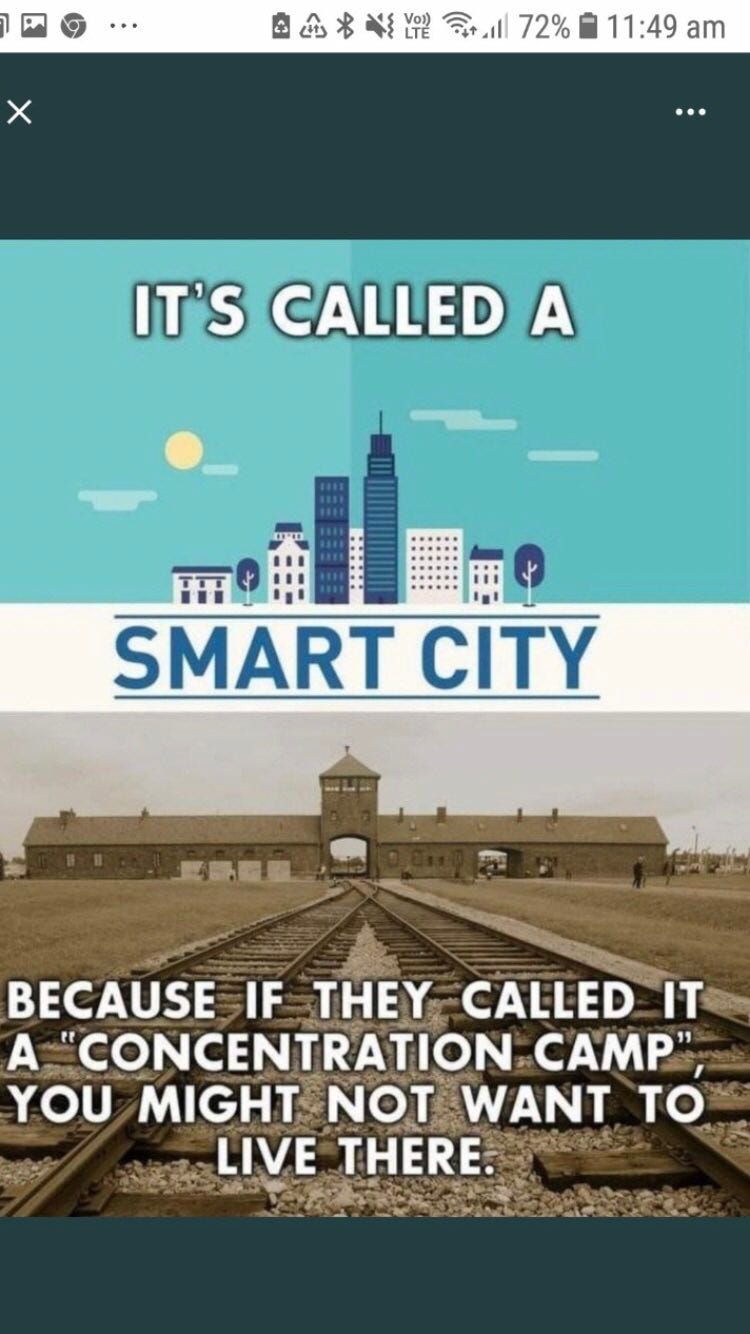Five 'American' cities are slated to go SMART
THREE are in California...one is where I live
Anyone who subscribes to my Substack is well aware of how evil and dystopian SMART CITIES are. They’ll be promoted by Mockingbird corporate media as advanced, revolutionary, sustainable...when in fact, they are digital concentration camps — where you have no property, privacy, or free will.
I’m of the belief that if ‘disaster’ strikes anyplace super attractive to Elites, the rich, developers, etc., you’ll see the list grow longer.
Here’s the an official (though incomplete) list from the wretched Wikipedia.
Columbus, Ohio
In the summer of 2017, the City of Columbus, Ohio began its pursuit of a smart city initiative. The city partnered with American Electric Power Ohio to create a group of new electric vehicle charging stations. Many smart cities such as Columbus are using agreements such as this one to prepare for climate change, expand electric infrastructure, convert existing public vehicle fleets to electric cars, and create incentives for people to share rides when commuting. For doing this, the U.S. Department of Transportation gave the City of Columbus a $40 million grant. The city also received $10 million from Vulcan Inc.[77]
One key reason why the utility was involved in the picking of locations for new electric vehicle charging stations was to gather data. According to Daily Energy Insider, the group Infrastructure and Business Continuity for AEP said, "You don't want to put infrastructure where it won't be used or maintained. The data we collect will help us build a much bigger market in the future."[77]
Because autonomous vehicles are currently seeing "an increased industrial research and legislative push globally", building routes and connections for them is another important part of the Columbus smart city initiative.[77]
New York City, New York
New York is developing a number of smart city initiatives. An example is the series of city service kiosks in the LinkNYC network. These provide services including free WiFi, phone calls, device charging stations, local wayfinding, and more, funded by advertising that plays on the kiosk's screens.[78]
San Leandro, California
The city of San Leandro is in the midst of transforming from an industrial center to a tech hub of the Internet of things (IoT) (technology that lets devices communicate with each other over the Internet). California's utility company PG&E is working with the city in this endeavor and on a smart energy pilot program that would develop a distributed energy network across the city that would be monitored by IoT sensors. The goal would be to give the city an energy system that has enough capacity to receive and redistribute electricity to and from multiple energy sources.[79]
Santa Cruz, California
In Santa Cruz, local authorities previously analyzed historical crime data in order to predict police requirements and maximize police presence where it is required.[80] The analytical tools generate a list of 10 places each day where property crimes are more likely to occur, and then placing police efforts on these regions when officers are not responding to any emergency. The city of Santa Cruz suspended the use of predictive policing technology in 2018, after there were questions about its validity in such a small community.
But oopsie, the clowns at Wikipedia missed one. I knew it! I knew it! I knew it!
How Los Angeles Plans to Become a Smarter City by the 2028 Olympics
LA recently released a smart city roadmap that envisions a highly digital and connected future.
An excerpt:
This year it will also work to incentivize fiber-optic buildout and by 2023 adopt an IoT policy that “details the shared usage of sensors to avoid redundant IoT sensor networks that congest the urban environment.” By 2024 the city intends to install 10,000 public electric vehicle chargers, and by 2026 it will build a “public-private partnership for an open-source IoT Integration Platform to leverage public and private smart infrastructure.”
IoT is the Internet of Things. In the future, once everyone has been chipped, per Klaus Schwab (2:27 on this clip from level-headed host Dave Rubin), it will be the IoB: Internet of Bodies.
(Sooooo, basically, A.I. will run your life.)
I’ll leave you with this thought: The Elites hate, hate, hate that we live in ex-burbs, suburbs, and rural areas. They want us warehoused in wired concrete canyons.
My spidey sense tells me that soon after the Olympics Closing Ceremony here in Los Angeles, ‘disaster’ will strike the Hollywood Hills and other lush areas. Most fortunately, lots of ‘housing’ that was built for athletes & media will have just been vacated.
This is their blueprint. Will they succeed? Probably, but the question is how will we respond?
Thanks for living in my brain for a few minutes. I owe ya!



Here's a fun little anecdote re: "Smart Columbus." They have several partners, including Battelle and LBrands.
https://smartcolumbus.com/about/partners
Who is Batelle? Why, they are involved in the Ukranian biolabs.
Who is LBrands? well, they were started by Les Wexner (friend of Jeffrey Epstein), who still owns a small stake in the company.
Another note: outside of Columbus in a suburb called New Albany (home of Les Wexner) there are a bunch of power lines going to the middle of nowhere. In that middle of nowhere (surrounded by empty land or farmland) is an Alphabet/ Google data center, an Amazon distribution center and what appears to be a minimum security prison that is, in actuality, a Meta data center. All are located next to each other and are not that far from where an Intel plant is going to go.
“smart” just means surveillance. I have a surveillance phone.